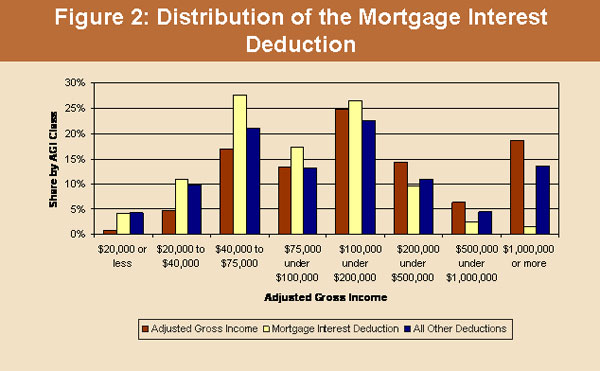Well there are two things that need to be looked at. Do you have more deductions that you can claim besides the mortgage interest? And what additional amount is your mortgage above the standard deduction?
The standard deduction for 2013 was $6,500. So if the only thing you have to itemize is your mortgage interest than it needs to be over $6,500 for you to get any sort of tax break at all, assuming you're an individual. So here's an example...
You bought a $250,000 dollar home and put down 20% which leaves you with a $200,000 mortgage. It's at 4.25% since it's your primary residence. At the very most you'll pay $8,500 a year in interest. Thus putting you over the $6,500 limit. Let's also say you're an average American household and you fall into the 25% tax bracket. With the mortgage tax deduction you'd get back $2,125 for your refund, assuming all else constant. This is deceiving though because you would have gotten back $1,625 from your standard deduction regardless. So the difference is only $500!
Now don't get me wrong I love $500 as much as the next guy, but good Lord I don't think I want to saddle myself with debt shackles for decades just for a maximum amount of $500. I've heard multiple CPAs preach this same point. However, there's another point that needs to be made, and that's opportunity cost.
Opportunity cost is an economic principle that says for each action there is also a cost associated with that action or cost. What's the opportunity cost for going to the beach for 3 hours? Well, how much could you make/save by using that time doing something else? My entire life is constantly consumed with opportunity cost calculations. A very difficult one to make is whether you should pay off your mortgage early or not. While this actually may cost you some real money. It could cost you even more in opportunity cost. How?
Well by diverting funds from other investments in order to pay it off early you are costing yourself money, if those other investments are netting you more cash. Case in point. If you're not fulling funding your 401K or not paying off other loans that have higher interest rates, than you're screwing yourself. With that said, if you're in a pretty much perfect position financially and you can afford to pay it offer early. Especially when the stock market and/or real estate market is overvalued. Than yes by all means pay that bitch off!
Regardless, there is a certain amount of personal satisfaction when you know you own your house and nobody, but the govt can take it from you. Another great thing is it frees up cash flow to make other investments AND banks love it when you're completely debt free!
-CC

 RSS Feed
RSS Feed
